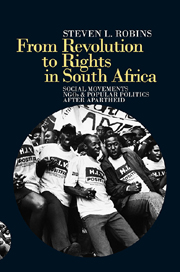 From Revolution to Rights in South Africa
From Revolution to Rights in South Africa Book contents
- Frontmatter
- Contents
- Foreword & Acknowledgements
- Abbreviations
- Zapiro cartoons
- 1 Introduction
- 2 Activist Mediations of ‘Rights’ & Indigeneous Identity
- 3 Citizens & ‘Bushmen’
- 4 ‘Civil Society’ & Popular Politics in the Postcolony
- 5 AIDS, Science & the Making of a Social Movement
- 6 Rights Passages from ‘Near Death’ to ‘New Life’
- 7 Sexual Rights & Sexual Cultures
- 8 Conclusion
- Bibliography
- Index
6 - Rights Passages from ‘Near Death’ to ‘New Life’
AIDS Activism & New HIV-identities in South Africa
Published online by Cambridge University Press: 05 April 2013
- Frontmatter
- Contents
- Foreword & Acknowledgements
- Abbreviations
- Zapiro cartoons
- 1 Introduction
- 2 Activist Mediations of ‘Rights’ & Indigeneous Identity
- 3 Citizens & ‘Bushmen’
- 4 ‘Civil Society’ & Popular Politics in the Postcolony
- 5 AIDS, Science & the Making of a Social Movement
- 6 Rights Passages from ‘Near Death’ to ‘New Life’
- 7 Sexual Rights & Sexual Cultures
- 8 Conclusion
- Bibliography
- Index
Summary
Introduction
This chapter investigates how the moral politics of AIDS activism in South Africa is contributing towards new forms of subjectivity, identity and citizenship. Whereas Chapter 5 focused on the politics of AIDS and the emergence of a rights-based social movement, this chapter is concerned with the relationship between individual and collective experiences and interpretations of the extreme experiences of the illness and stigmatisation of AIDS sufferers. I argue that it is precisely the extremity of ‘near death’ experiences of full-blown AIDS, and the profound stigma and ‘social death’ associated with the later stages of the disease, that produce the conditions for AIDS survivors' commitment to forms of ‘responsibilised citizenship’ (Rose 2007) and social activism. It will be argued that it is the NGO and social movement involvement in the mediation and retelling of these traumatic experiences that can contribute towards facilitating the individual's commitment to ‘responsible’ lifestyles and ‘positive living’. It is the profound negativity of stigma and social death that animates the activist's construction of a new positive HIV-positive identity and understanding of what it means to belong to a social movement and community of people living with AIDS.
- Type
- Chapter
- Information
- From Revolution to Rights in South AfricaSocial Movements, NGOs and Popular Politics After Apartheid, pp. 127 - 143Publisher: Boydell & BrewerPrint publication year: 2008


